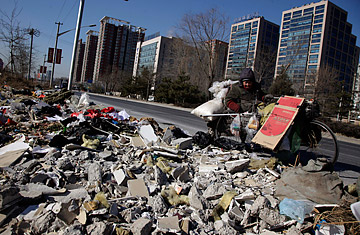
A man scavenges for resalable materials among garbage accumulated along a road in Beijing on Jan. 20, 2011
(2 of 2)
Previously unlicensed garbage sites proliferated because of poor management by the authorities. The growth of the new garbage zones, however, is driven by deliberate action in search of profits. According to Wang's rough calculation, more than one-third of such dumps are rented out as businesses.
Yet the Beijing government's official adviser and specialist in waste disposal, Wang Weiping, denies there is a new set of problems around the city's garbage. He reckons the problem was real in the late 1980s, but says the dumps "are far fewer and less dense now."
Gold Mining
By comparison with regulated dumps — which require considerable measures for dust-prevention, antiseepage and antipollution — wild dumps require nothing of the sort, making the cost of operating them much lower. The contractor doesn't make much money out of collecting garbage. The most profitable part of business lies in recycling the waste.
Pit operators charge for dumping according to the contents. "In fact, if your trash contains a lot of valuable stuff for recycling, not only don't you pay, on the contrary, the operator might be paying you," Wang told me.
I also visited a garbage station in the Chaoyang district of Beijing. This is supposed to be the only station that takes food waste, but very little actually arrives there.
According to the station's workers, waiting buyers collect waste from the city's big restaurants and resell it as swill for pigs. Food waste is the most valuable. As a result, it's mostly taken away by buyers who select what they want and dump the rest in illegal landfills.
What's more, though the idea of separating garbage is a good one, the practice is far from ideal. Before garbage is sent to public-run garbage stations, it has already been picked over by scavengers.
According to Wang, Beijing had as many as 100,000 people working as scavengers in 2010, and together they cleared away some 4 million tons of trash. Beijing's annual production of garbage is 6.5 million tons. That shows how much profit there is in the garbage business.
Although separating garbage is supposed to be a precondition for reducing waste, the problem is that after the scavengers have finished their picking, they take their booty to the Fifth Ring Road, to the 100 or so waste-material trading points. Some of what they bring will be rejected, and so new dumps form again.
Also from Worldcrunch:
A Onetime "Nazi Resort" Now a Youth Hostel
— Die Welt
Welcome to 21st Century Sarajevo
— Economic Observer
The Egyptian Revolution, Class Conflict and "Thuggery"
— Al Masyral Youm
